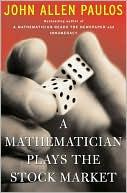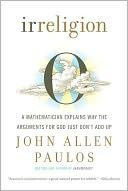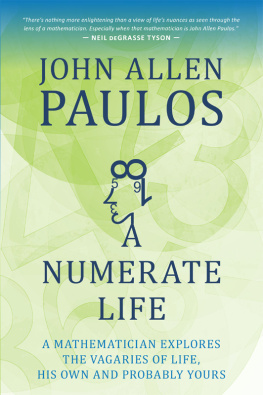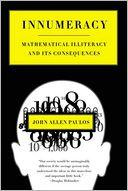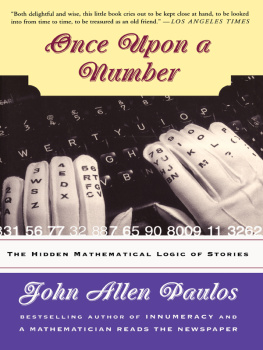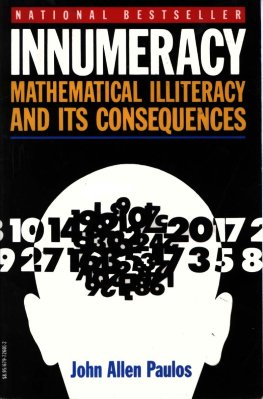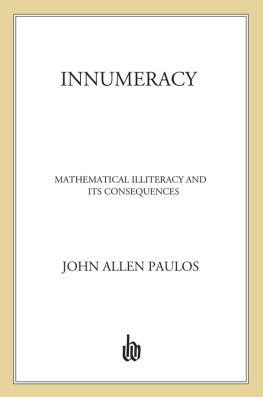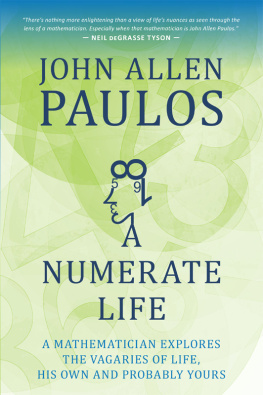John Allen Paulos - Beyond Numeracy
Here you can read online John Allen Paulos - Beyond Numeracy full text of the book (entire story) in english for free. Download pdf and epub, get meaning, cover and reviews about this ebook. year: 1992, publisher: Vintage, genre: Home and family. Description of the work, (preface) as well as reviews are available. Best literature library LitArk.com created for fans of good reading and offers a wide selection of genres:
Romance novel
Science fiction
Adventure
Detective
Science
History
Home and family
Prose
Art
Politics
Computer
Non-fiction
Religion
Business
Children
Humor
Choose a favorite category and find really read worthwhile books. Enjoy immersion in the world of imagination, feel the emotions of the characters or learn something new for yourself, make an fascinating discovery.

- Book:Beyond Numeracy
- Author:
- Publisher:Vintage
- Genre:
- Year:1992
- Rating:5 / 5
- Favourites:Add to favourites
- Your mark:
- 100
- 1
- 2
- 3
- 4
- 5
Beyond Numeracy: summary, description and annotation
We offer to read an annotation, description, summary or preface (depends on what the author of the book "Beyond Numeracy" wrote himself). If you haven't found the necessary information about the book — write in the comments, we will try to find it.
Beyond Numeracy — read online for free the complete book (whole text) full work
Below is the text of the book, divided by pages. System saving the place of the last page read, allows you to conveniently read the book "Beyond Numeracy" online for free, without having to search again every time where you left off. Put a bookmark, and you can go to the page where you finished reading at any time.
Font size:
Interval:
Bookmark:

John Allen Paulos
BEYOND NUMERACY
John Allen Paulos received his Ph.D. in mathematics from the University of Wisconsin. Now professor of mathematics and presidential scholar at Temple University in Philadelphia, he is the author of the widely acclaimed books Mathematics and Humor and I Think, Therefore I Laugh , and, most recently, of the national best-seller Innumeracy: Mathematical Illiteracy and Its Consequences.
ALSO BY JOHN ALLEN PAULOS
Innumeracy: Mathematical Illiteracy and Its Consequences
I Think, Therefore I Laugh
Mathematics and Humor
For my parents, Helen and Peter,
the source of my Xs and Ys
Id also like to thank Rafe Sagalyn,
Robert Frankel, and Sheila, Leah,
and Daniel Paulos.
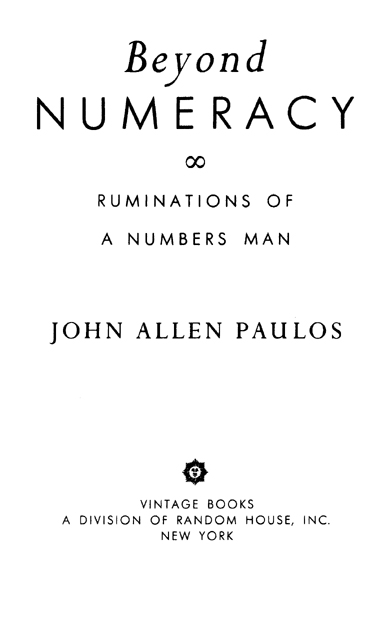
FIRST VINTAGE BOOKS EDITION, APRIL 1992
Copyright 1991 by John Allen Paulos
Line drawings copyright 1991 by Christine Swernoff
All rights reserved under International and Pan-American Copyright Conventions. Published in the United States by Vintage Books, a division of Random House, Inc., New York, and simultaneously in Canada by Random house of Canada Limited, Toronto. Originally published in hardcover by Alfred A. Knopf, New York, in 1991.
Library of Congress Cataloging-in-Publication Data
Paulos, John Allen.
Beyond numeracy: ruminations of a numbers man/John Allen Paulos1st Vintage Books ed.
p. cm.
eBook ISBN: 978-0-307-83333-4
ISBN 0-679-73807-X (pbk.)
1. Mathematics. I. Title.
QA7.P28 1992
510dc20 91-50598
CIP
v3.1
CONTENTS
This book is in part a dictionary, in part a collection of short mathematical essays, and in part the ruminations of a numbers man. Although it contains many entries (brief essays) arranged in alphabetical order and depicting a broad range of mathematical topics, the book differs from a standard dictionary in that its entries are less comprehensive, longer, and in some cases quite unconventional.
By necessity, this book contains more facts and principles than most essay compilations. I have nevertheless tried to retain the personal tone and unifying voice of such collections. In other words, this book was written by an individual with specific interests (not all of them mathematical), biases (math as a liberal art and not merely as a tool for technologists), and pedagogical strategies (involving storytelling and unusual applications). Although the subject is mathematics and not me, I have made no attempt to exclude myself from the picture, hoping to serve as the readers personal guide through a subject that is unnecessarily daunting to many. My intended audience is intelligent and literate, but largely innumerate (mathematically illiterate).
I received a surprising volume of mail from readers of my previous book Innumeracy who wrote that the book had whetted their interest in mathematics, and that they now wanted something more to satisfy their newly awakened appetite for the subjectsomething of similar style and texture that would take them beyond simple numeracy. I immodestly quote from one womans letter: Its innumerate to say perhaps, but I wish you would write another book that was exactly the same, only differentsomething that goes a little further. I hope this book will be both appealing and helpful to her and successful in providing its readers with a nontechnical but mostly uncompromising view of mathematics and its relation to our world.
There are a lot of people who appreciate the beauty and importance of mathematics but who, short of going back to college, see no way to pursue this interest. Theyve been led to believe that without a knowledge of formalisms, theorems, and symbolic manipulations, mathematical ideas are utterly beyond them. I think this is false and even pernicious. One can learn from Montaigne, Flaubert, and Camus without reading French, and one can learn from Euler, Gauss, and Gdel without solving differential equations. Whats needed in each case is a translator fluent in both languages.
As such a would-be translator, Ive striven to avoid as much as possible not only equations but also elaborate diagrams, tables, and formal symbols. I do include a few illustrations and brief mentions of some common mathematical notations because these are sometimes indispensable and especially useful when consulting other books. For the most part, however, the exposition uses wordsEnglish ones.
The entries range from summaries of whole disciplines (calculus, trigonometry, topology) to biographical and historical asides (Gdel, Pythagoras, non-Euclidean geometry) to bits of mathematical or quasi-mathematical folklore (infinite sets, Platonic solids, QED) well known to mathematicians but not to the educated layman and laywoman. Occasionally, I include less conventional piecesa review of a nonexistent book, a stream-of-mathematical-consciousness car trip, brief discussions of humor or ethics. New areas are discussed (chaos and fractals, recursion, complexity) as well as more classical ones (conic sections, mathematical induction, prime numbers).
Im guilty throughout of committing flagrant category mistakes: including as entries mathematical topics, pedagogical principles, little homilies, anecdotal vignettes as if they were all coordinate. I dont apologize, since these disparate discussions illustrate the frequently overlooked fact that mathematics is a many-layered human endeavor and not just a body of formal theorems and calculations.
Writing mathematical papers is different from writing about mathematics, but I think there neednt and shouldnt be such a chasm between the two activities. (Ive often daydreamed of announcing the solution to a famous unsolved problem in a popular book instead of in a traditional research journal.) With regard to the accuracy of the various entries, Ive tried here to steer a delicate course: writing precisely enough to preclude collegial disdain (collegial disinterest in such a popular work is inevitable), yet clearly enough to avoid readers possible misconceptions. When clarity and precision come into conflict, as they sometimes do, Ive opted in most cases for clarity.
A widespread misconception about mathematics is that it is completely hierarchicalfirst arithmetic, then algebra, then calculus, then more abstraction, then whatever. (What comes after advanced calculus? Answer: serious gum disease.) This belief in the totem pole nature of mathematics isnt true, but it prevents many people who did poorly in seventh-grade, high school, or even college mathematics from picking up a popular book on the subject. Often very advanced mathematical ideas are more intuitive and comprehensible than are certain areas of elementary algebra. My point is: If you get stuck or dont understand something, continue on and the fog will probably lift, often even in the same entry.
Finally, I recall the self-described innumerates Ive known who have been surprised when Ive remarked on their mathematical insight. Having a traditional computational view of mathematics, such people usually characterize their insightful comments as logic or common sense and not as mathematics; they remind me of the Molire character who was shocked to discover that he had been speaking prose all his life. This book is therefore written for unknowing mathophiles (among others) who have been thinking math all their lives without realizing it.
The entries are largely independent and lightly cross-referenced.
Font size:
Interval:
Bookmark:
Similar books «Beyond Numeracy»
Look at similar books to Beyond Numeracy. We have selected literature similar in name and meaning in the hope of providing readers with more options to find new, interesting, not yet read works.
Discussion, reviews of the book Beyond Numeracy and just readers' own opinions. Leave your comments, write what you think about the work, its meaning or the main characters. Specify what exactly you liked and what you didn't like, and why you think so.

